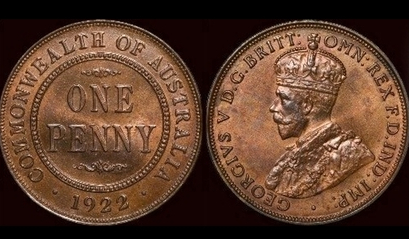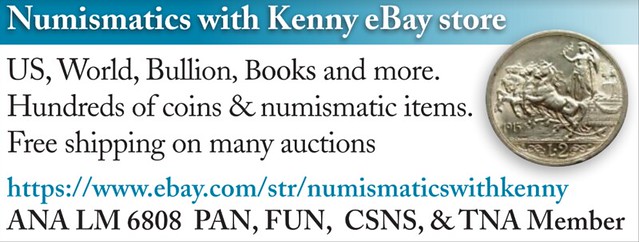
PREV ARTICLE
NEXT ARTICLE
FULL ISSUE
PREV FULL ISSUE
THE 1922 AUSTRALIAN SPECIMEN PENNYAndrew Crellin of Sterling & Currency published this well-researched article on the Australian 1922 Specimen Penny, one of the very first copper coins struck at the Perth Mint. Here's a short excerpt - see the complete article online for more. -Editor Further batches of penny dies were sent to the Perth Mint from both the Melbourne Mint and the Royal Mint in London throughout 1922, these allowed the Perth Mint to strike 1922-dated pennies right up until February 1923. The total number of pennies struck by the Perth Mint during this period came to £15,110, or approximately 3,626,400 coins. The amount distributed locally in Perth ranged between £50 per month and £640 per month, which clearly shows that the vast majority of the pennies struck by the Perth Mint during this period (£10,000 out of £15,110, or around 66% of total production) were shipped to the Commonwealth Sub-Treasury in Sydney for circulation on the Eastern seaboard. The demand for pence by the local banks in Perth prior to 1921 was approximately £800 worth or 192,000 coins per annum, a sum that is clearly a modest fraction of the £10,000 ordered by Treasury. Although it was previously thought that the Perth Mint was given the task of producing pence so that it may assist the Commonwealth Treasury in catering for West Australia's currency needs, the facts suggest that it was given this task more for the reason that there was very limited capacity at the Sydney and Melbourne Mints in 1921, at a time when economic demand showed no signs of abating.
On July 10th, 1923, Deputy Master Campbell wrote a telegram to the Fremantle Harbour Trust requesting that part of the freight charges for the shipment of £500 in pence (120,000 coins, or 1.2 tons) to Sydney on July 6th, 1923 be refunded. We can obtain some confirmation that the Perth Mint was delegated the production of pence during 1922 for the Eastern states in his statement that Campbell's comment, coupled with the relatively limited demand for pence in WA when compared to the size of Treasury's order gives a strong indication that the Perth Mint was only given the task of producing pence due to a lack of capacity at the Sydney & Melbourne Mints at a time of urgent demand. It seems that the increased output of copper coins by the Sydney, Melbourne and Perth mints between 1919 and 1922 eventually satisfied the economy's demand for circulating coinage. In 1923, the Commonwealth Treasury reverted to its policy of forwarding all orders for copper and silver coinage to the Sydney and Melbourne mints. Perth was no longer considered for this work for several reasons. Due to declining gold receipts, the Sydney and Melbourne mints were operating below capacity, and they could now easily handle the additional work of producing Commonwealth coinage. As Perth was far from the major population centres of the Eastern seaboard, it was more efficient to produce coins in Sydney or Melbourne whenever possible.
The Discovery of the Specimen Strike 1922 Penny
To read the complete article, see:
Wayne Homren, Editor The Numismatic Bibliomania Society is a non-profit organization promoting numismatic literature. See our web site at coinbooks.org. To submit items for publication in The E-Sylum, write to the Editor at this address: whomren@gmail.com To subscribe go to: https://my.binhost.com/lists/listinfo/esylum All Rights Reserved. NBS Home Page Contact the NBS webmaster 
|

